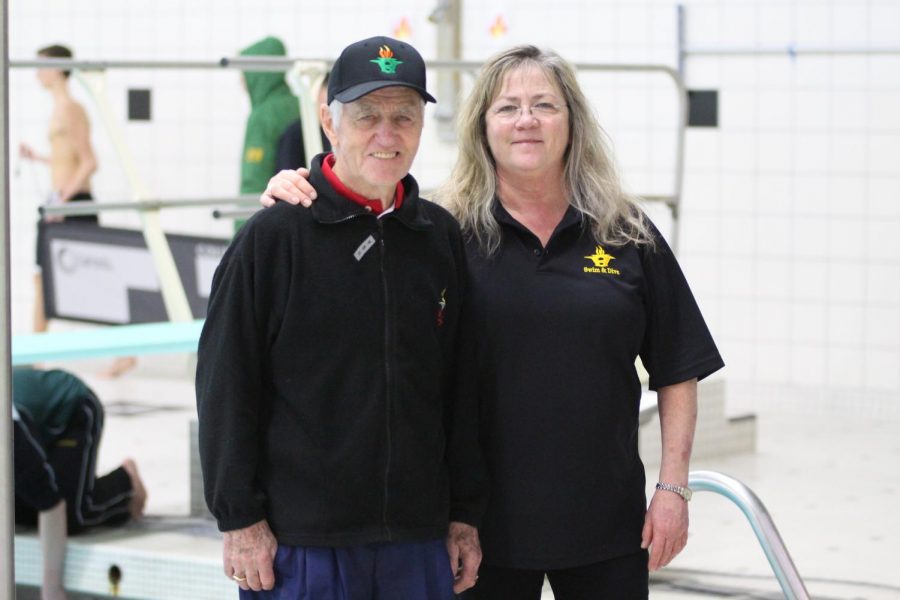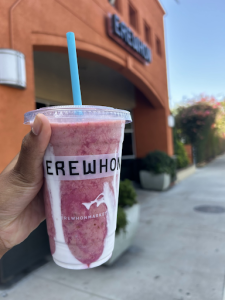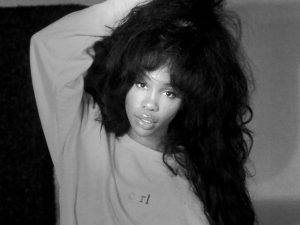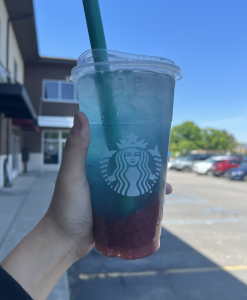Olympic coach and daughter working with Huron divers
Vicki and Dick Kimball photographed in Huron High school’s swimming pool.
November 30, 2019
The summer of 1968, the Olympics were in Mexico City. Micki King, diving for the USA, was leading with two dives to go on the 3-meter springboard.
And then, the unexpected happened: on her next dive, a reverse-one-and-a-half layout, King broke her arm on the board.
King’s longtime coach, Dick Kimball, was heartbroken.
“The win’s in your hand, and you lose it,” he remembered.
He had coached King since before Title IX.
“It was hard trying to get her back up,” he said.
Four years later, in Munich 1972, Kimball found himself again poolside, staring intently. King, now known as the “old person” in the competition, was third going into the final dive. And with that final, perfect dive, she leapt into the gold medal position.
That was unbelievable.
Kimball’s had his fair share of shocking diving experiences. He’s coached for 43 years as the head coach at the University of Michigan, after all. Many of his divers have made the Olympic team—five have won Olympic championships, five silver, and three bronze.
He’s become the legal guardian for divers so they can train in Ann Arbor. He’s pioneered and popularized new diving and training techniques.
“I started a system that everybody in the world uses now: on trampoline, I can actually maneuver the belt and keep a person spinning,” Kimball explained. He calls it tipping or kipping. “It eliminates a lot of the fear. It also teaches the divers how to use their eyes.”
He’s even coached a diver who dove for five years without an eardrum.
“His dad, an ears-nose-throat doctor, tried everything to get his eardrum to grow back,” Kimball remembered, smiling. “He just had an ear plug and would clean it out after the workout. Finally, after five years, one day he came in and he had an eardrum. It grew back. His dad was surprised.”
There was also the meet in East Germany.
“We just got ripped off in the judging. There was so much cheating,” Kimball said. “Later, we talked to the German coaches. They said, you think you got robbed here? Wait until you get to Russia. They had a guy sitting in the stands calculating and telling the judges what to give.”
When Kimball’s swimmers saw that happening, they sat in front of the man so he couldn’t get the manipulated scores to the judges.
“So they gave him a table and chair [poolside]. And he sat on the deck and calculated.”
Kimball himself started diving as a seventh grader on the high school team, placing ninth in the Minnesota state championship. In eighth grade, he came in third, before going unbeaten for four straight years in high school.
Back then, the team would hitchhike to summer meets throughout the state. During practice, no space was set aside for divers—the swimmers were right underneath the board.
“The ceiling wasn’t very high,” Kimball said. “We could jump up and grab a beam above us.”
Now, diving runs in the Kimball family. His son, Bruce Kimball, won the Olympic silver medal for 10m platform in 1984. His daughter, Vicki Kimball, who now also coaches Huron’s divers, was two-time Michigan High School Champion and four-time National Age Group Champion at Pioneer, and she qualified for the World and Olympic Trials three times.
Coaching his own kids, however, was different.
Vicki was exposed to diving early on, trying 1-meter and 3-meter springboards since she was young. Oh, and at one point, Micki King was her babysitter.
“It’s a little harder coaching your kids because you’ve got to go home at night,” Dick said. At one point, training mode has to turn off.
“When we were at my dad’s diving camp near Tampa, we would be diving while there were tornado watches in nearby cities,” Vicki said. “That’s the truth! We would be diving 10-meter.”
They would be up training until late at night, only realizing the danger of being on such a high outdoor platform once they got home.
“Your hair would stand up with all the electricity,” Dick said.
Vicki said there were times when she would land flat on a dive and refuse to learn any new ones, when she was around 10. (“My parents kicked me off the team twice, because they thought I wanted to quit.”) Her dad would crawl to the foot of her bed and whisper to her about the next day’s training.
“He did it more than once,” Vicki said. “If I was awake, I would yell at him.”
“There was another 10-year-old girl living with us at the camp,” Dick added. “At night, I would write her notes saying things like, ‘tomorrow, full twist one and a half or else.’”
Vicki laughed. “He was evil!”
Vicki’s coaching style has elements of her dad’s, but she’s adapted it to the teams and divers she’s worked with.
“I think that the apple doesn’t fall far from the tree,” Vicki said. “I teach the skills very similarly, because I learned from him. There may be things that he would do that I wouldn’t. Sometimes I would tell dad what I wanted him to do with the divers after workouts, and he would make them do more dives than I wanted. But it’s fine. It’s like a coaching marriage.”
She remembers one time the University of Michigan was hosting nationals.
“I was standing next to my dad, and there was a cameraman right behind us,” Vicki said. “We were watching the board, standing exactly the same way, same hand and everything. You learn body language from your parents, I think.”
Both say the most challenging part of coaching is asking kids to do dives knowing what it feels like to go 35 miles an hour off a 10-meter platform, hitting the water on your stomach or back. It’s important to know when to push and when to back off.
“It’s hard to be a coach,” Vicki said. “It’s like being a parent, probably, and you don’t have control over the fact that your child is going to be sad or not doing well in school. You can’t go take the test for them. I can’t go do the dive for them.”











